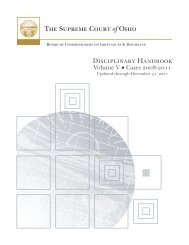State v. Winters - Supreme Court of Ohio - State of Ohio
State v. Winters - Supreme Court of Ohio - State of Ohio
State v. Winters - Supreme Court of Ohio - State of Ohio
Create successful ePaper yourself
Turn your PDF publications into a flip-book with our unique Google optimized e-Paper software.
to provide the defense with evidence that is within the state’s possession or control. <strong>State</strong><br />
v. Morgan, 12th Dist. No. CA2008-08-035, 2009-<strong>Ohio</strong>-6050, 23. Furthermore, evidence<br />
that was not available until the time <strong>of</strong> trial need not be excluded simply because the<br />
prosecution could not notify the defense <strong>of</strong> the evidence prior to trial. <strong>State</strong> v. Clark (Aug.<br />
5, 1992), 1st Dist. No. C-910541, at 2.<br />
17.<br />
{ 44} Here, the prosecution only intended to use the edited videotape at trial.<br />
However, at trial, when one <strong>of</strong> its witnesses gave unexpected conflicting testimony, the<br />
prosecution learned that there was a video recording to substantiate that Ostrander entered<br />
the bathroom first and appellant is the man who returned to the store and followed<br />
Ostrander and the greeter into the bathroom to retrieve a set <strong>of</strong> keys. It also provided<br />
additional evidence that appellant entered and exited the store several times, a fact which<br />
the defense indicated in opening remarks could not be proven. We conclude that the state<br />
did not violate Crim.R. 16(B)(1)(c) since the tape was not in the prosecution's possession<br />
prior to trial. Furthermore, the surveillance video merely confirmed the testimony <strong>of</strong> the<br />
cashier that appellant entered and left the store several times.<br />
{ 45} Appellant's third assignment <strong>of</strong> error is not well-taken.<br />
{ 46} In his fourth assignment <strong>of</strong> error, appellant argues that his appointed counsel<br />
rendered ineffective assistance.<br />
{ 47} Appellant bears the burden <strong>of</strong> proving that his counsel was ineffective since<br />
an attorney is presumed competent. Strickland v. Washington (1984), 466 U.S. 668, 689,<br />
and <strong>State</strong> v. Lott (1990), 51 <strong>Ohio</strong> St.3d 160, 174, certiorari denied (1990), 498 U.S. 1017.

















